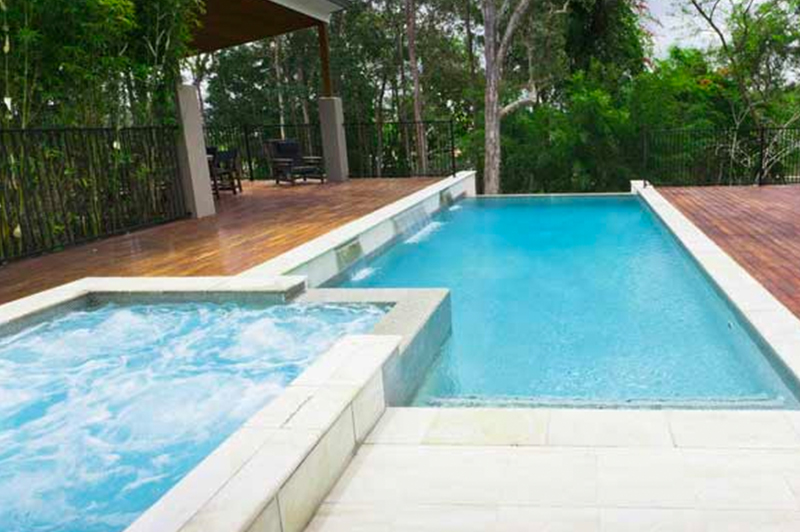What Causes Algae in Pools and How to Prevent It

A sparkling pool is every owner’s dream, but when algae appears, it can quickly turn that dream into a maintenance nightmare.
Making sure you know why algae grows in pools – and how to prevent them – is key to keeping your pool clear, fresh, and ready to enjoy.




Poor Water Circulation
One of the main culprits behind algae growth is poor water circulation. When water isn’t circulating correctly, sanitising chemicals, such as chlorine, don’t reach all parts of the pool. This creates pockets where algae can start to grow and multiply.
A pool pump that’s working properly is essential to keep water moving and to avoid these stagnant areas.


Low Chlorine Levels or pH Imbalance
Chlorine is your primary defence against algae and bacteria in pools. When chlorine levels drop – which can happen due to hot weather, heavy rain, or frequent pool use – algae have the perfect opportunity to take hold.
Make sure you are regularly testing and adjusting chlorine levels to ensure your pool remains safe and algae-free.
The balance of the pool’s pH level also plays a role. If the pH is too high or too low, it affects chlorine’s ability to kill off contaminants, which can lead to algae growth.
Maintaining a balanced pH keeps chlorine effective and helps prevent algae from taking over. A balanced pH also makes swimming more comfortable, so it’s a win-win for both cleanliness and enjoyment.




Debris in the Pool
When this debris is left in the water, it starts to break down and release nutrients, which feed algae. Regularly skimming the pool and removing debris helps cut off this food source, making it harder for algae to thrive.
Using a pool cover when the pool is not in use is also helpful in reducing the amount of leaves or dirtl that gets in.

Effective Algae Prevention Tips
Regular water testing is crucial to keep an eye on chlorine, pH, and alkalinity levels. By testing your pool water at least once a week, you’ll be able to make necessary adjustments before any issues arise, keeping algae at bay.
Running your pool’s pump daily also keeps the water moving, which reduces the chance of algae finding areas to settle. Aim to run the pump for 8 to 12 hours a day, especially in warmer weather, to ensure proper circulation.
Occasional shock treatments can also be beneficial, particularly after heavy use, rain, or extreme heat. Shocking the pool with a high dose of chlorine kills off algae spores and keeps the water sanitised.
An effective prevention strategy also includes keeping leaves and other debris out of the pool, as organic material provides nutrients that algae feed on. Skimming the pool regularly and keeping it covered when not in use reduces these risks.



Let Dolphin Pools Help You Keep Algae at Bay
If keeping algae out of your pool feels like a lot of work, Dolphin Pools is here to make it simple.
With expert water testing, routine cleaning, and maintenance support, Dolphin Pools can help keep your pool algae-free all year.
Call us today on (03) 9830 5744 to experience hassle-free pool care that leaves your water crystal clear and inviting – because a clean pool is one you’ll always want to dive into!
